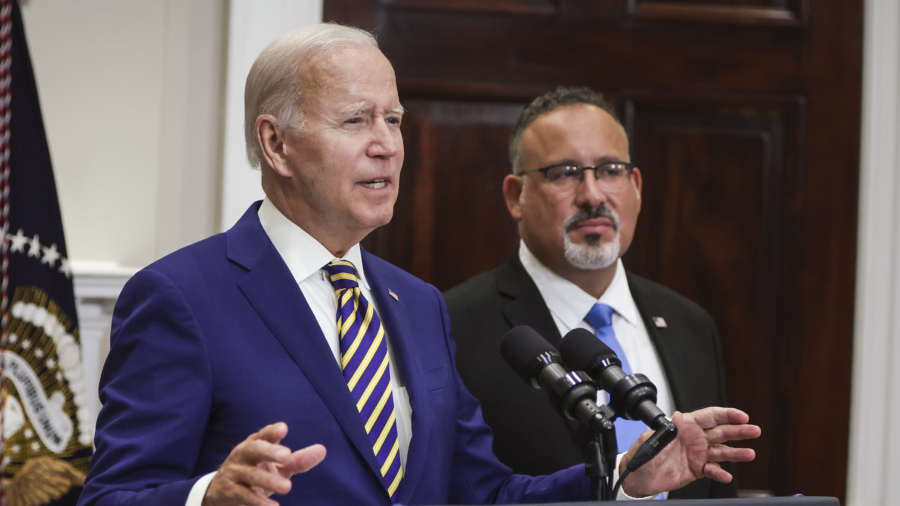About nine million people who had applied for President Joe Biden’s student loan forgiveness plan received an email saying they were approved, and then weeks later they received another email saying that the first email was inaccurate because legal challenges to the plan have forced it to be put on hold.
A first wave of emails, sent out by the Department of Education, arrived in applicants’ inboxes on Nov. 21, informing them that up to $20,000 of their student debt cancellation had been approved. The email also contained an update about “where the program stands amid a flurry of legal setbacks,” according to a money.com report.
“We reviewed your application and determined that you are eligible for loan relief under the Plan,” Secretary of the Department of Education Miguel Cardona wrote in the email. “We have sent this approval on to your loan servicer. You do not need to take any further action.”
But on Dec. 13, a second wave of emails from the Department arrived to those same applicants, this time correcting what it called an error in the first.
The email informed the recipients, “you recently received an email with a subject line indicating your application for the one-time Student Loan Debt Relief Plan had been approved. The subject line was inaccurate.”
The email further explained, “We have received your application but are not permitted to review your eligibility because of ongoing litigation. We will keep your application information and review your eligibility if and when we prevail in court.”
Blaming the mistake on “a vendor error,” the email apologized for the confusion, adding, “you do not need to take any further action at this time. We will keep you updated with any developments.”
Blocked by Court
One Twitter user expressed disappointment with the news, “This is a shame. I do recall receiving an email last month stating that My application has been approved.”
Another, working a minimum wage job and trying to pay off loans, complained about the setback. “An apology is not enough for the elation and deflation that I received,” the post said.
According to money.com, the Department of Education timeline had originally set Oct. 23 as the day that application processing would begin. The Department estimated a six-week turnaround, encouraging applicants to submit before Nov. 15 so that their loan balances would reflect the reduction before regularly-scheduled loan repayments were set to restart in Jan. 2023.
On Nov. 22, the Department of Education stopped accepting applications, in a statement blaming “callous efforts to block student debt relief in the courts.”
The Department said over 26 million people had already applied, out of which 16 million had been approved.
In the same statement, the Department announced that it would extend the freeze on loan repayments and waive interest and collections well into 2023. Then, the freeze was scheduled to end on Dec. 31, 2022.
“If the program has not been implemented and the litigation has not been resolved by June 30, 2023—payments will resume 60 days after that,” the statement said.
“It isn’t fair to ask tens of millions of borrowers eligible for relief to resume their student debt payments while the courts consider the lawsuit,” Biden said in a video posted on Twitter.
This announcement marked the program’s eighth extension since it was instituted in March 2020 under the HEROES Act (pdf) as a financial relief response to the COVID-19 pandemic.
Supreme Court Review
Meanwhile, the Supreme Court has agreed to hear two separate cases challenging Biden’s student loan forgiveness plan and its use of the HEROES Act to justify it.
In the first, filed (pdf) in September, six Republican-led states—Iowa, Kansas, Nebraska, Missouri, Arkansas, and South Carolina—alleged that Biden’s “Mass Debt Cancellation is not remotely tailored to address the effects of the pandemic on federal student loan borrowers, as required by the HEROES Act.” The lawsuit claimed that the administration disregarded the Act’s “express requirements” and distorted it “beyond recognition” in order to serve “the Administration’s political agenda.”
The second, filed (pdf) in October, two individual borrowers—Myra Brown and Alexander Taylor—alleged that they were unfairly excluded from Biden’s plan and were denied an opportunity to comment as required under the Administrative Procedure Act.
Job Creators Network, the nonprofit legal foundation representing Brown and Taylor, said in a statement that if Biden’s student loan forgiveness plan isn’t stopped “it will give the executive branch a blank check, not only for this president, but every future president without any input from Congress or any public participation.”

